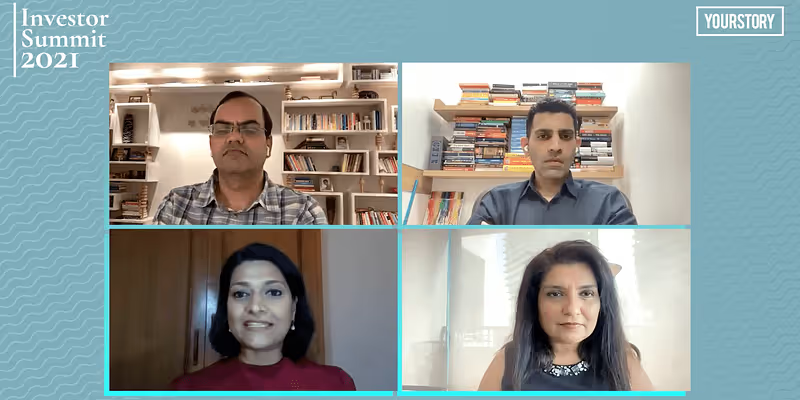The March 2020 lockdown translated into a hit for almost every startup. However, adoption of the ‘new normal’ and technology provided clarity, including on investments.
At YS’s Investor Summit 2021, Seema Chaturvedi, Founder, Managing Partner, AWE Funds; Ashish Dave, CEO, Mirae Asset Venture Investments (India); and Amit Somani, Managing Partner, Prime Venture Partners; discussed the state of tech investments during and post the pandemic. The panel was moderated by Shivani Muthanna, Associate Programme Producer, YS.
Amit said people were just taking stock of the situation during the first couple of months of the pandemic in 2020. “But, gradually things were getting back to normal. And now, there has been some frenzied kind of deal activity and companies, and the quantum of the deal flow we’re seeing is like never before,” he said, adding that there was no slowdown in terms of investment.
“We are growth-stage investors but the reason we launched an early-stage fund is that we noticed that tech investment and entrepreneurial activities had picked up significantly after the lockdown,” Ashish said.
Through the gender lens
While Amit and Ashish share their insights on increased funding in the new normal, Seema focused on investments for women-led businesses.
“Unfortunately the impact and the burden of COVID-19 was not gender-neutral. This was true globally, but in the context of India, labour participation for women is dismally low at 22 percent on the aggregate and at 16 percent in cities…the trajectory is downward sloping. So, when you look at an already downward sloping graph, and you add the compounding effect of COVID to that, there was reasonable concern,” Seema said.
However, she added that there was a silver lining amid this: the urgency of digital adoption. The pandemic led women-led businesses to take to digital adoption like never before, a plus to some extent.
Seema’s company, AWE Funds, invests in five sectors: health, food, agritech, fintech, and sustainability, of which green energy and water are two important sub-sectors.
“We are seeing an interesting engagement and embodiment of SaaS in these vertically oriented applications. So, we’re excited about the adoption of tech in what were traditionally legacy sectors, giving us a reason to be optimistic,” she said.

A screen grab of the session
Eyeing international professionalism
Amit Somani and his partners, Sanjay Swamy and Shripati Acharya, spent several years in the Silicon Valley before coming back to India. They were keen to bring the Valley style of professionalism to India, especially at the early stage.
“In the early-stage, pre-product-market fit, we work with the startups very closely in the manner of what an early-stage fund in the US would do. That’s what we are trying to uniquely bring to the table here beyond the capital that we offer to these companies,” Amit said.
Speaking along similar lines, Ashish said many international companies like Gojek were moving their data, back offices, engineering teams, and delivery centres into India, “because we have the engineering talent”. “That is a model that we are seeing and that’s where we have an advantage in terms of talent where we have everything.”
He proffered another advantage: the familiarity that Indians have with English, which bridges a language gap and can help sell products globally.
Focus on data privacy
After the talk about international adoption and involvement, Shivani put forth another important question with respect to the anti-China wave in India. “Do you believe India has the wherewithal to launch product apps and startups that could directly compete with these startups and do funds in India have enough capital to put into the startup ecosystem because of this whole anti-China wave?”
Ashish said: “Everybody is going to have geopolitics whenever they launch any market or they raise capital. In fact, diplomacy and geopolitics play on for a long time, and we cannot ascertain the exact number of years.”
Talking about whether India can launch product apps, he said, “Facebook is delivering pro-global products into India and people don’t have a problem. I think till the time you’re not crossing a line, and as long as you are respecting people’s privacy, it will not matter.”
He added that clarity on how people’s data was is going to be stored and managed, and whether that particular local regime would have access to some data, and whether or not it was infringing people’s privacy was needed. In fact, a number of companies, including TCS and other MNCs, have built their products from India itself.
Investing in women-led businesses
Seema said less than 2 percent of venture funding goes to women-led businesses. In that sense, she said AWE looked at the team, product, or service with some protection around their intellectual property to the best extent possible, scalable markets, and an ability to really get to back to profitability.
“We look for tangible manifestation or product-market fit. In our view, revenues are a good source of funding. Profit is an even better source, so we do want to see a path to profitability,” she said.
Driving digital adoption
The pandemic took everything virtual amidst the lockdown – from ordering food through digital payments to using Zoom to stay connected. The adoption of digital platforms to execute these day-to-day activities has been massive, and with physical contact being a complete no-no, numerous people from older generations are also adapting to digital systems.
“I think we will move faster into the digital world post COVID-19 and leapfrog on several technologies. This is the reason why a lot of investors are bullish on India, because all investments are made in the hope that most companies would plateau after a certain point in time. They were earlier not able to crack Tier II and III markets because of the strong inertia towards digital adoption,” Ashish said.
He added that when companies are profitable and routes are available, they will always be able to raise capital to be sustainable. This is likely to lead to an initial public offering (IPO).
“In the next few years, we will see around 10 to 15 IPOs, and that will validate the entire financing ecosystem, starting from seed to exits at IPO. which will also give participation to the Indian retail investors into the Indian tech story,” Ashish said.

![You are currently viewing [Investor Summit 2021] What the tech investment landscape looks like in a post-pandemic India](https://blog.digitalsevaa.com/wp-content/uploads/2021/04/Image30fd-1617252699313.jpg)







